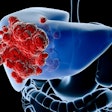Iodized oil has held its own in the field as a diagnostic tool and for the treatment of hepatic tumors for nearly two decades. The latest version, iodine 131 iodized oil, has been approved in France for the treatment of inoperable hepatocellular carcinoma with portal venous thrombosis.
In a preliminary study by researchers at the Institut Gustave Roussy in Villejuiff, France, iodine 131 did not live up to expectations. Twenty-four patients were injected with iodine 131; three had a partial response initially. A dozen patients had a stable response to treatment while the remaining eight saw the disease progress.
A high rate of treatment-induced hepatic failure was seen, causing one death and discontinuation of treatment in six patients. In addition to a low efficacy rate, iodine 131 hepatic therapy can be costly and cumbersome because patients must be isolated for seven days after treatment, the authors wrote.
To see the full text of this article, visit
www.rsnajnls.org
In a preliminary study by researchers at the Institut Gustave Roussy in Villejuiff, France, iodine 131 did not live up to expectations. Twenty-four patients were injected with iodine 131; three had a partial response initially. A dozen patients had a stable response to treatment while the remaining eight saw the disease progress.
A high rate of treatment-induced hepatic failure was seen, causing one death and discontinuation of treatment in six patients. In addition to a low efficacy rate, iodine 131 hepatic therapy can be costly and cumbersome because patients must be isolated for seven days after treatment, the authors wrote.
To see the full text of this article, visit
www.rsnajnls.org
















